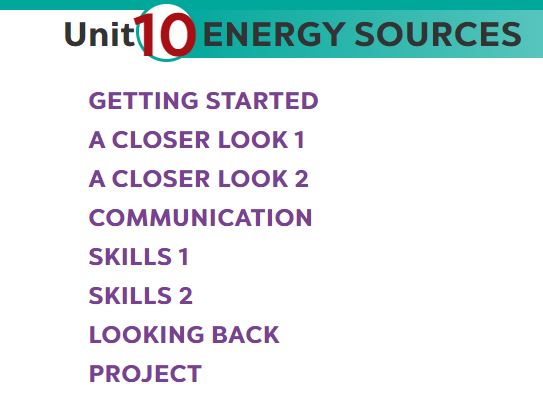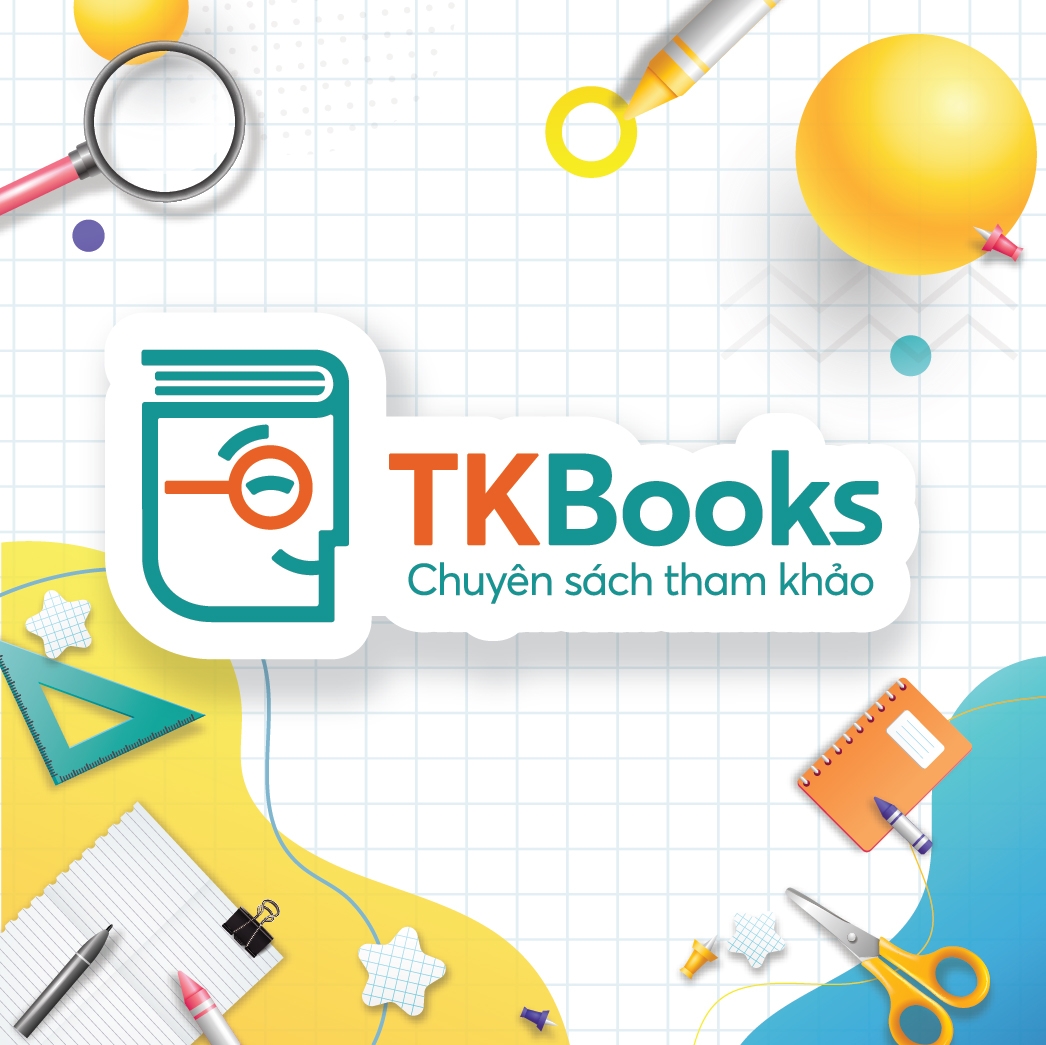Chưa có sản phẩm trong giỏ hàng.
Tiếng Anh 7 Unit 10: Energy Sources kèm đáp án chi tiết
Tiếng Anh 7 Unit 10: Festival around the world trong sách giáo khoa tiếng Anh 7 Global Success sẽ bao gồm 8 phần chính bao gồm: GETTING STARTED, A CLOSER LOOK 1, A CLOSER LOOK 2, COMMUNICATION, SKILLS 1, SKILLS 2, LOOKING BACK, GETTING STARTED.
Dưới đây là nội dung từng phần kèm đáp án chi tiết của Unit 10: Energy Sources trong sách tiếng Anh 7.
Mời các em tham khảo!
>> Xem thêm: Tiếng anh 7 Unit 9: Festival around the world
I. Tiếng Anh 7 Unit 10: Energy Sources
GETTING STARTED
1. Listen and read.
Lan: Hi, Dad.
Mr Tan: Lan, what are you doing? It’s pretty late now.
Lan: I’m doing a project on energy sources. But I don’t quite understand what energy is.
Mr Tan: Well, it’s power that we use to provide us with light, heat or electricity.
Lan: Oh. Where does it come from?
Mr Tan: It comes from many different sources like coal, oil, natural gas,…
We call them non-renewable sources.
Lan: Can it come from the sun, wind or water too?
Mr Tan: Yes, it can. We call those types of energy renewable sources because we cannot run out of them. Renewable means we can easily replace them.
Lan: I get it now.
Mr Tan: You know, some types of energy are cheap and easy to use, but others are more expensive and harder to find…
2. What are Lan and her father talking about?
- Energy.
- Sources.
- Energy sources.
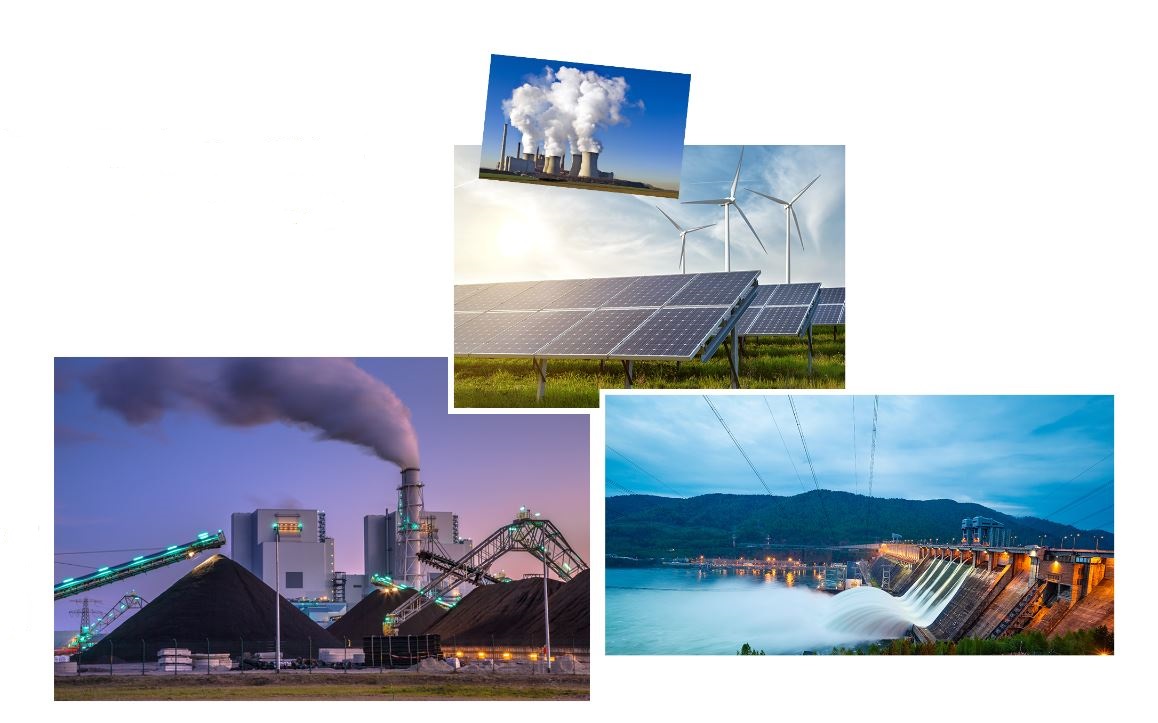
3. Read the conversation again and answer the following questions.
- What is Lan doing?
- What does energy mean?
- Where does energy come from?
- What are renewable sources?
4. Match the words/phrases in the box with the correct pictures.
- oil
- wind energy
- coal
- natural gas
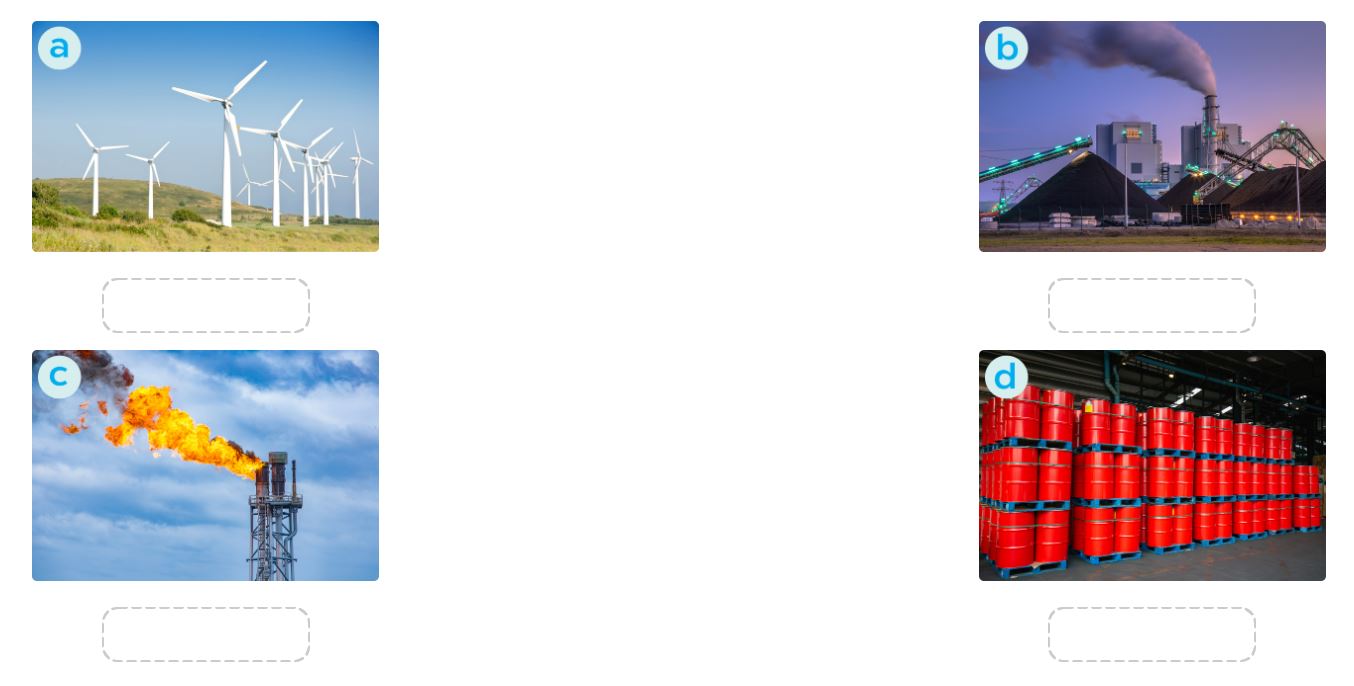
5. Complete each of the sentences with the correct word from the conversation.
- Energy is _________ that we use to provide us with light, heat or electricity.
- When energy comes from the ___________ wind and water, we call it renewable energy.
- When energy comes from wind, we call it ___________ energy.
- We cannot __________ out of renewable energy.
- Some types of energy are ___________ and easy to use.
A CLOSER LOOK 1
1. Match the types of energy in A with the energy sources in B.
| A | B |
| a. water | 1. solar energy |
| b. nuclears | 2. wind energy |
| c. wind | 3. hydro energy |
| d. the sun | 4. nuclear energy |
2. Write the phrases to label the pictures.
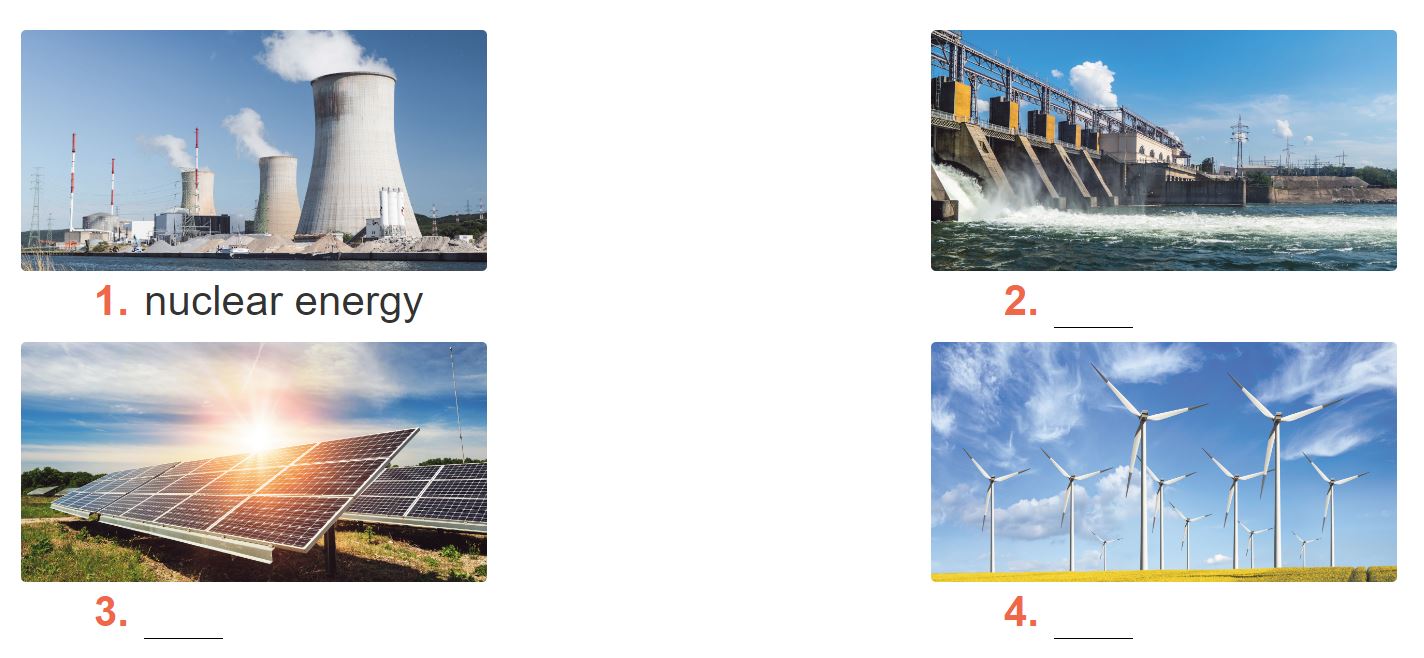
3. Complete the sentences with the words and phrases from 1 or 2.
- A good place to change __________ to energy is near the sea because of the sea breezes.
- They are putting solar panels on the roof of our building to produce ___________.
- When energy comes from __________, we call it hydro energy.
- They are reducing the use of __________ because it is not safe to produce.
4. Listen and repeat. Pay attention to the stressed syllables in the words.
| ‘energy | re’cycle |
| ‘dangerous | ex’pensive |
| ‘easily | po’lluting |
| ‘government | re’sources |
5. Listen and repeat, paying attention to the stressed syllables in the underlined words.
- Nuclear ‘energy is ‘dangerous and ex’pensive.
- We should ride a bike when ‘travelling short ‘distances.
- The word “re’cycle” has three ‘syllables.
- Burning coal is po’lluting our environment.
- Our ‘government is looking for new sources of ‘energy to replace gas.
A CLOSER LOOK 2
1. Work in pairs. Tell your partner what the people in the pictures are doing.
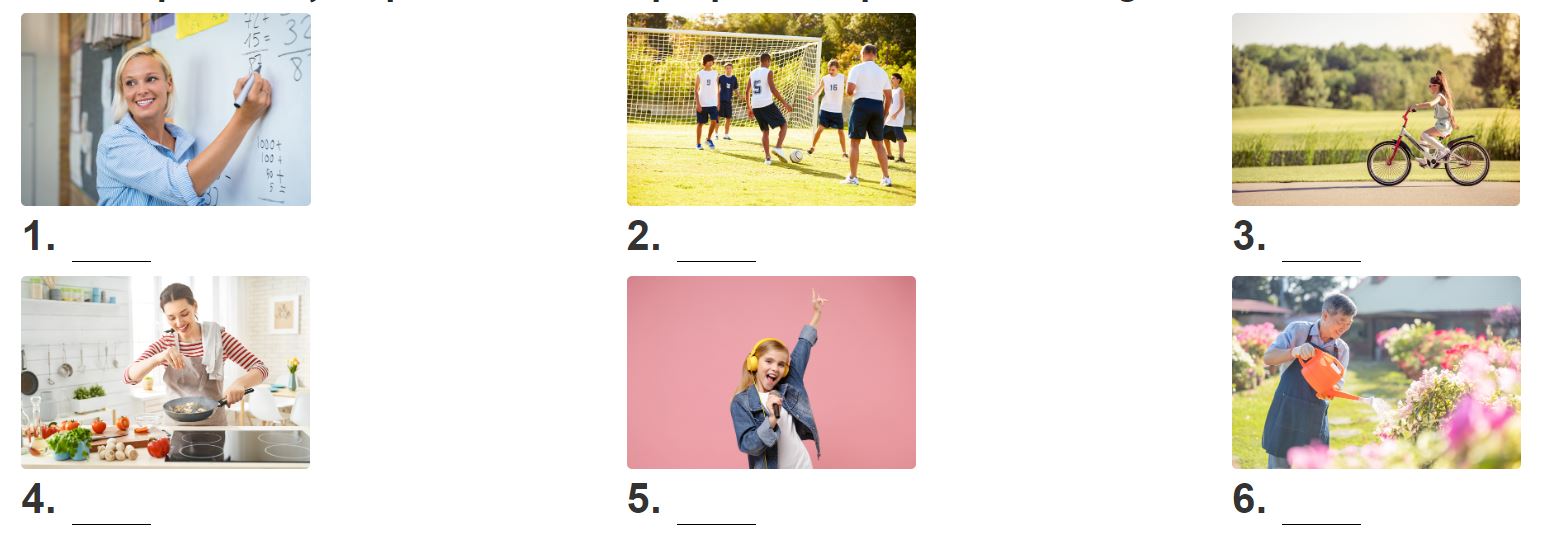
Remember!
We use the present continuous to express:
– an action happening now or at the moment of speaking.
Example: The students are doing a project in the classroom now.
– an action around now but not necessarily at the moment of speaking.
Example: Scientists are looking for a new energy source to replace coal.
We can use the words or phrases: now, right now, at the moment, today, nowadays, this week/month, etc. with the present continuous.
2. Complete the sentences, using the present continuous form of the verbs in brackets.
- Mai (talk) ________ about types of energy sources now.
- We (use) ________ solar energy to replace energy from coal today.
- Keep quiet! The students of Class 7C (take) _________ a test.
- Scientists (develop) __________ new energy sources to protect the environment.
- We (reduce) ________ the use of nuclear energy nowadays.
3. Circle the correct form of the verb in each sentence.
- Are you still work / working on your project now?
- Nam and Lan do / are doing quite well at school this year.
- Does she study / Is she studying at the school library at the moment?
- Hoa studies / is studying for her exam, so she can’t come to the party right now.
- We have / are having English three times a week.
4. Write sentences about what the people are doing or not doing, using the suggestions.
- The students / do the project / now.
______________________________________________
- Mrs Lien / teach us about solar energy / at the moment.
______________________________________________
- They learn about energy / this month.
______________________________________________
- She not swim / in the swimming pool / right now.
______________________________________________
- Nowadays, people in Iceland / not use energy from coal.
______________________________________________
5. Work in pairs. Ask and answer the following questions.
- What book are you reading now?
- What sport are you playing these days?
- What courses are you taking this term?
- What are you doing to save energy?
COMMUNICATION
1. Listen and read the conversation. Pay attention to the highlighted questions.
Lan: What does “solar energy” mean?
Mr Tan: Well, it’s energy that comes from the sun.
Lan: And what does “wind energy” mean?
Mr Tan: It’s another type of energy, and it comes from wind.
2. Work in pairs. Make similar conversations to ask for explanations of the phrases: hydro energy, energy from coal…
3. Work in pairs. Ask your partner the following questions and tick (√) his or her answers in the boxes.
| Yes | No | |
| 1. Do you go to school on foot? | 󠇬 | 󠇬 |
| 2. Do you use public transport? | 󠇬 | 󠇬 |
| 3. Do you use low energy light bulbs at home? | 󠇬 | 󠇬 |
| 4. Do you use solar energy to warm water? | 󠇬 | 󠇬 |
| 5. Do you turn off the lights when going to bed? | 󠇬 | 󠇬 |
| 6. Do you turn off the TV when not watching it?s | 󠇬 | 󠇬 |
4. Work in groups. Tell the group how well your partner saves energy.
Example: Mai saves a lot of energy. She often goes to school on foot and uses public transport. She always turns off the lights when going to bed.
5. Answer the questions in 3 on your own. Then tell the class how well you save energy.
Example: I don’t save much energy. I go to school on foot, but I don’t turn off the TV when not watching it.
SKILLS 1
1. Work in pairs. Discuss the following questions.
- What are the main energy sources in Viet Nam?
- What type(s) of energy sources will we use in the future?
2. Mr Lam is giving a lecture on energy sources. Read the text and choose the best option (A, B, or C) to complete the sentences.
Hello, class. Today I’d like to tell you about two energy sources. They are non-renewable sources and renewable sources.
Non-renewable sources are coal, oil and natural gas. We can use these sources to produce energy. They are cheap and easy to use. People use them a lot. But they are very limited and will run out soon.
Renewable sources come from the sun, wind or water. When energy comes from the sun, we call it solar energy. Wind energy comes from the wind, and hydro energy comes from water. Renewable sources are available, clean and safe to use. But they are expensive to produce.
In the future we will rely more on renewable energy sources. They are better for the environment and they will not run out.
1. Non-renewable sources are cheap and __________.
A. available
B. easy to use
C. expensive
2. __________ come from the sun, wind or water.
A. Renewable sources
B. All energy sources
C. Non-renewable sources
3. When energy comes from water, we call it _____________.
A. wind energy
B. solar energy
C. hydro energy
4. Renewable energy sources are better for ____________.
A. the environment
B. our cars
C. hydro energy
3. Read the text again and answer the questions.
- How many energy sources are there? What are they?
- What do non-renewable sources include?
- What are the advantages of renewable energy?
- What will we rely more on in the future?
4. Work in groups. Discuss and put the following words and phrases in the appropriate columns.
| run out | cheap | limited | expensive |
| safe to use | good for the environment | easy to use | available |
| Advantages _________________________________ | Disadvantages ________________________________ |
5. Work in pairs. Ask and answer questions about the advantages and disadvantages of different energy sources.
Example:
A: What are the advantages of hydro energy?
B: It’s available, clean and safe to use.
A: What are its disadvantages?
B: It’s expensive to produce.
SKILLS 2
1. Work in pairs. Answer the questions.
- What type of energy do you use at home?
- What do you usually do to save energy?
2. Mr Lam is discussing with his students about how to save energy at home. Listen and tick the phrases you hear.
| 1. save energy | 󠇬 |
| 2. turn off the lights | 󠇬 |
| 3. save money | 󠇬 |
| 4. use low energy light bulbs | 󠇬 |
| 5. produce electricity | 󠇬 |
| 6. use solar panels | 󠇬 |
3. Listen again and tick (✔) T (True) or F (False) for each sentence.
| T | F | |
| 1. Mr Lam says we use energy for cooking, heating and lighting. | ||
| 2. Linh always turns off the lights when going out. | ||
| 3. Linh turns off electrical appliances when not using them. | ||
| 4. Minh uses low energy light bulbs at his house. | ||
| 5. Minh uses solar energy to cook meals. |
4. Work in pairs. Read some ways to save energy at home. Choose three ways and write them in your notebook.
- Use low energy light bulbs
- Use solar panels to warm water
- Turn off the lights when leaving the room
- Turn off electrical appliances when not using them
5. Write a paragraph of about 70 words about how you save energy at home.
We use a lot of energy at home and it costs us a lot. To save energy, we should…..
LOOKING BACK
1. Match the adjectives in A with the nouns in B to make phrases.
| A | B |
| 1. solar | a. water |
| 2. hot | b. energy sources |
| 3. electrical | c. energy light bulbs |
| 4. renewable | d. appliances |
| 5. low | e. energy |
2. Complete the sentences, using the phrases in 1.
- We should use _______ in our homes to save energy.
- Do they always turn off the ________ before leaving the room?
- We can protect the environment by using _______.
- When energy comes from the sun, we call it_______.
- She has _______ day and night because she has solar panels on the roof of her house.
3. Complete the sentences by using the correct form of the present continuous or present simple of the verbs in brackets.
- Look! It (rain) ________ heavily.
- Normally they (start) _________ school at eight o’clock in the morning.
- He hasn’t got a bike at the moment, so he (walk) _________ to school this week.
- He always (do) _______ his homework in the evening.
- I’m afraid I have no time to help just now. I (write) ________ an essay.
4. Find ONE mistake in each sentence and correct it.
- The students do the project in Unit 10 now.
→ ____________________________________________________
- At the moment, the teacher is explain how solar energy works.
→ ____________________________________________________
- Nowadays, people in Africa is not using energy from natural gas.
→ ____________________________________________________
- They are use wind energy instead of coal.
→ ____________________________________________________
- We look for a cheap, clean and effective source of energy now.
→ ____________________________________________________
PROJECT
1. Below are some tips about how students can save energy at school. In groups, discuss which ones can be applied in your school.
- Some tips to save energy at school:
- Turn the lights off when you leave the classroom.
- Turn off electrical appliances when they are not in use.
- Don’t overheat or overcool the classrooms.
- Check that none of your taps around the school are dripping.
2. Work in groups. Discuss some tips about how to save energy in your school. Then make a poster and present it to your class.
Now I can…
| Now I can… | ✓ | ✓✓ | ✓✓✓ |
| • use the words related to types of energy sources. | |||
| • pronounce three-syllable words with correct stress. | |||
| • use the present continuous. | |||
| • ask for explanations. | |||
| read about types of energy sources. | |||
| talk about the advantages and disadvantages of different energy sources. | |||
| listen to get information about how to save energy at home. | |||
| write a paragraph about how to save energy at home. |
II. Đáp án tiếng Anh 7 Unit 10: Energy Sources
Để xem đáp án sách tiếng Anh 7 Unit 10: Energy Sources, các em hãy quét mã QR dưới đây, sau đó truy cập vào App Tkbooks để xem cũng như làm bài tập online luôn nhé!
Ngoài ra, các em cũng nên mua cuốn sách Làm chủ kiến thức tiếng Anh 7 bằng sơ đồ tư duy để củng cố thêm kiến thức và cải thiện kỹ năng tiếng Anh của mình.
Link đọc thử sách: https://drive.google.com/file/d/1XrS7Awoyi_dwiCwiPRVY5APKoKH9i9Ph/view
Chúc các em làm tốt bài tập và đạt điểm cao môn tiếng Anh trên lớp.
Tkbooks tự hào là nhà xuất bản sách tham khảo cho học sinh lớp 7 hàng đầu tại Việt Nam!

